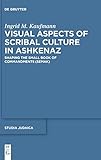Visual Aspects of Scribal Culture in Ashkenaz : Shaping the 'Small Book of Commandments' (SeMaK) / Ingrid M. Kaufmann.
Material type: TextSeries: Studia Judaica : Forschungen zur Wissenschaft des Judentums ; 103Publisher: Berlin ; Boston : De Gruyter, [2019]Copyright date: ©2019Description: 1 online resource (X, 229 p.)Content type:
TextSeries: Studia Judaica : Forschungen zur Wissenschaft des Judentums ; 103Publisher: Berlin ; Boston : De Gruyter, [2019]Copyright date: ©2019Description: 1 online resource (X, 229 p.)Content type: - 9783110569384
- 9783110573626
- 9783110574418
- Artists' books -- France -- 13th century
- Artists' books -- Germany -- 13th century
- Ashkenazim
- Jewish illumination of books and manuscripts -- France -- 13th century
- Jewish illumination of books and manuscripts -- Germany -- 13th century
- Judaism -- History -- Medieval and early modern period, 425-1789
- Aschkenas
- Juden
- Jüdische Buchkultur
- Mediävistik
- LITERARY CRITICISM / Jewish
- Ashkenaz
- Jewish Book Culture
- Jews
- Medieval History
- BM182 .K38 2019
- online - DeGruyter
- Issued also in print.
| Item type | Current library | Call number | URL | Status | Notes | Barcode | |
|---|---|---|---|---|---|---|---|
 eBook
eBook
|
Biblioteca "Angelicum" Pont. Univ. S.Tommaso d'Aquino Nuvola online | online - DeGruyter (Browse shelf(Opens below)) | Online access | Not for loan (Accesso limitato) | Accesso per gli utenti autorizzati / Access for authorized users | (dgr)9783110574418 |
Frontmatter -- A note of thanks -- Contents -- Abbreviations, transliteration and translation -- 1. Introduction -- 2. The historical context -- 3. The SeMaK as a book -- 4. The manuscripts in their entirety -- 5. The scribes -- 6. Five manuscripts in detail -- 7. Conclusion -- Appendix: Overview of manuscripts featuring the SeMaK -- Bibliography -- List of the manuscripts mentioned in this study -- Figures -- Index
restricted access online access with authorization star
http://purl.org/coar/access_right/c_16ec
The medieval Ashkenazi manuscripts of the Small Book of Commandments (Sefer Mitzvot Katan, or ‘SeMaK’ for short), which was written by Isaac of Corbeil, attest a scribal culture in which rabbinical knowledge and piety were combined with creative freedom in manuscript design. This study is concerned with the creation, composition and circulation of manuscripts of the SeMaK and concentrates on the book as an artefact. The focus of the author’s attention is the manuscripts’ material nature, their artistic embellishment and the personal touches that scribes added to them. With the act of writing a text and decorating a SeMaK manuscript, they ‘appropriated’ the text, so to speak, giving it a character of its very own. They drew on a visual language in the process – or rather, on visual languages, which occupy a special place between pure writing culture and pure painting culture. It was in this area ‘in between’ the two that spontaneous touches arose, ranging from changes in the physical arrangement of the text (mise-en-page) to drawings and doodles added in the margins. An examination of paratextual elements broadens the reader’s knowledge about Jewish scribal culture and grants insights into medieval book art, material culture and Judeo-Christian co-existence in the Middle Ages as well as throwing some light on Jewish values, ideals and eschatological hopes.
Issued also in print.
Mode of access: Internet via World Wide Web.
In English.
Description based on online resource; title from PDF title page (publisher's Web site, viewed 28. Feb 2023)


